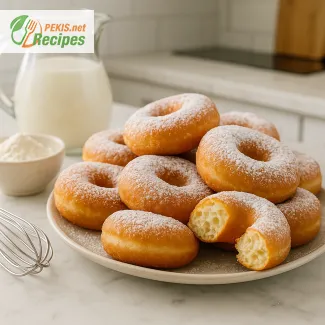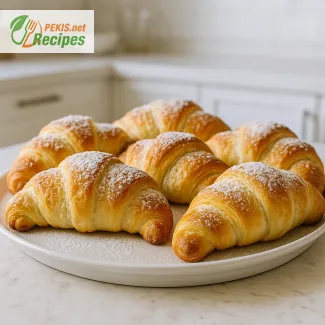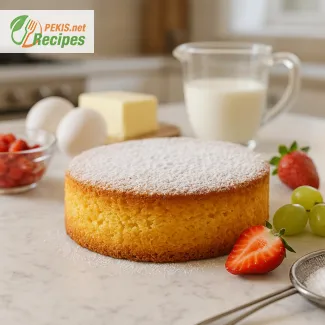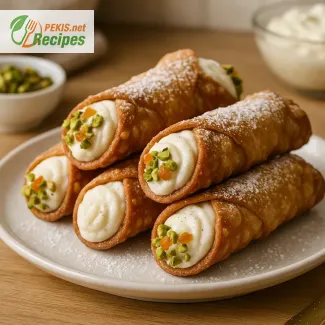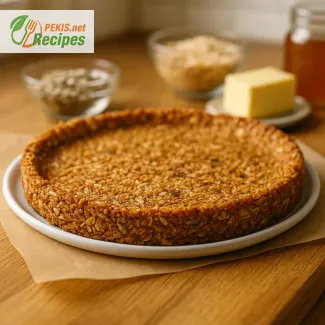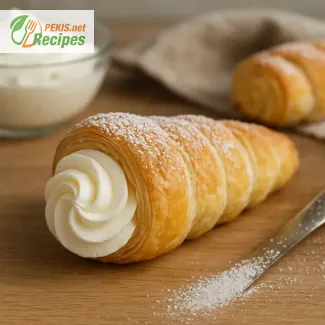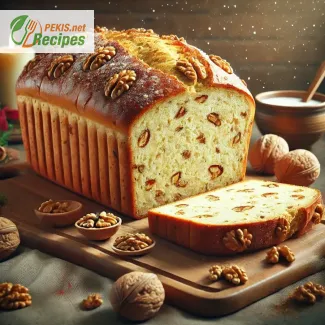
There’s something magical about the holidays that brings out the baker in all of us, and Christmas Walnut Bread is the epitome of festive baking. With its rich, nutty aroma, perfectly soft texture, and golden crust, this bread is more than a treat—it’s a celebration of the season. Whether you’re hosting a cozy family gathering or preparing a thoughtful gift, this luxurious bread will leave an unforgettable impression.
Crafted with care and infused with the warm essence of Christmas spices, the softest Christmas Walnut Bread is a masterpiece of texture and flavor. The subtle sweetness of honey or brown sugar perfectly balances the earthy crunch of walnuts, while a touch of cinnamon and nutmeg weaves in the essence of the holidays. This bread isn’t just food; it’s a sensory journey that transforms your kitchen into a haven of festive joy.
What Makes This Christmas Walnut Bread Unforgettable?
The secret lies in its pillowy softness. By using a combination of enriched dough and a gentle kneading process, this bread achieves a cloud-like interior that melts in your mouth. High-quality ingredients like unbleached flour, fresh yeast, and a splash of warm milk ensure a perfect rise, creating a loaf that’s light yet sturdy enough to hold its shape.
What truly sets this bread apart, however, are the crunchy walnuts embedded in every slice. These are not just any nuts—they are lightly toasted to amplify their flavor, creating a delightful contrast to the soft, moist dough. The walnuts don’t just provide texture; they elevate this bread into a luxurious treat fit for the finest holiday tables.
Perfect Pairings for Christmas Cheer
Serve it warm from the oven with a generous smear of creamy butter, or let it cool for the perfect base to accompany a variety of spreads. Think homemade cranberry jam, rich hazelnut chocolate spread, or even a slice of aged cheese for a savory twist. It’s equally stunning as a standalone centerpiece on your holiday table, its golden crust adorned with a light dusting of powdered sugar or an elegant drizzle of icing.
For breakfast lovers, this bread can be transformed into French toast, absorbing just the right amount of egg custard while retaining its soft structure. Pair it with a hot cup of spiced cider or a frothy cappuccino to start your day with a festive flair.
Why You’ll Love Baking This Bread
- The Aroma: The combination of spices, toasted walnuts, and freshly baked bread fills your home with an irresistible fragrance that embodies the holiday spirit.
- The Texture: The tender crumb of this bread, paired with the slight crunch of walnuts, creates a satisfying bite that’s impossible to resist.
- The Simplicity: Despite its gourmet appeal, the recipe itself is surprisingly straightforward, making it accessible for bakers of all skill levels.
- The Versatility: This bread shines as a breakfast staple, a snack, or a dessert—making it a must-have for any festive menu.
Tips for Achieving Perfect Results
- Choose Fresh Walnuts: Stale nuts can ruin the flavor. For an extra layer of complexity, roast the walnuts lightly before folding them into the dough.
- Don’t Rush the Rise: Allow your dough ample time to proof. This step is crucial for achieving that airy, soft texture.
- Warm Ingredients Are Key: Cold ingredients can inhibit the yeast. Ensure your milk and butter are at room temperature or slightly warmed.
- Experiment with Spices: While cinnamon and nutmeg are classics, a pinch of cardamom or ground cloves can add a unique twist.
A Festive Tradition Worth Starting
Baking this soft Christmas Walnut Bread is more than a culinary endeavor; it’s an experience steeped in tradition and joy. Imagine the delight of your loved ones as they take their first bite, the warmth of the bread contrasting with the crunch of the nuts. It’s a taste of the holidays, crafted with love, and destined to become a cherished tradition.
Let this bread be the star of your Christmas celebrations. Whether you’re sharing it with family, gifting it to friends, or savoring it with a moment of quiet indulgence, the softest Christmas Walnut Bread will make your holidays unforgettable. Embrace the season, one delicious slice at a time!
- Prepare the Yeast Mixture:
Warm the milk to about 37°C (98°F). Dissolve 1 tsp of sugar and the yeast in the milk. Let it sit for 5–10 minutes until it forms a frothy layer. - Mix the Dough:
In a large mixing bowl, combine the flour, salt, cinnamon, nutmeg, and the rest of the sugar. Add the yeast mixture and melted butter. Knead the dough for 8–10 minutes until it becomes smooth and elastic. You can do this by hand or with a dough hook on a stand mixer. - Add the Walnuts:
Gently fold the chopped walnuts into the dough until evenly distributed. - First Rise:
Place the dough in a lightly oiled bowl, cover with a damp cloth, and let it rise in a warm spot for 1 hour, or until it doubles in size. - Shape the Bread:
Punch down the dough and shape it into a loaf. Place it in a greased or parchment-lined loaf pan. - Second Rise:
Cover the loaf and let it rise for another 30 minutes. Preheat the oven to 180°C (350°F). - Bake:
Brush the top of the loaf with beaten egg for a golden crust. Bake for 30–35 minutes, or until the bread is golden brown and sounds hollow when tapped on the bottom. - Cool and Serve:
Let the bread cool in the pan for 10 minutes, then transfer to a wire rack to cool completely. Slice and enjoy!
This festive bread brings flavor, health benefits, and joy to your holiday celebrations!
Tips to Perfect and Adapt the Recipe for the Softest Christmas Walnut Bread
Christmas Walnut Bread is a festive delight, but its beauty lies in its versatility and the ability to tweak the recipe for perfection. Whether you want to enhance its flavor, adjust the texture, cater to dietary needs, or simply make it your own, there are many ways to adapt and refine this recipe. Below, you’ll find professional tips and strategies to elevate your bread-making skills while keeping this holiday classic irresistible.
1. Achieving the Perfect Texture
The hallmark of this bread is its softness. To ensure a perfect, pillowy texture every time, consider these tips:
- Hydration Matters:
The ratio of liquid to flour is crucial. For an extra-soft crumb, slightly increase the milk by 10–15 ml (1–2 tsp). If the dough feels too sticky, lightly flour your hands during kneading rather than adding more flour to the mix. - Kneading Technique:
Proper kneading activates gluten, creating the structure that allows the bread to rise beautifully. Use the “stretch and fold” method to develop elasticity without overworking the dough, which can make it tough. - Enriched Dough:
Ingredients like butter, milk, and eggs contribute to the tenderness of the bread. For an even richer texture, you can substitute half the milk with heavy cream or add an extra egg yolk to the dough. - Steam During Baking:
Adding a pan of hot water to the oven or misting the loaf with water before baking creates steam, which results in a softer crust and prevents the bread from drying out.
2. Enhancing Flavor
Flavor is what makes this bread unforgettable. A few small tweaks can take the taste to new heights:
- Experiment with Sweeteners:
While sugar is traditional, swapping it for honey or maple syrup adds depth to the sweetness. For a more caramel-like flavor, consider using brown sugar. - Spice it Up:
Cinnamon and nutmeg are classic, but you can introduce additional spices like ground cardamom, ginger, or even a pinch of allspice for a unique twist. A teaspoon of orange or lemon zest can also brighten the flavor. - Nut Varieties:
Walnuts are the star, but feel free to mix in other nuts like pecans, hazelnuts, or almonds for variety. Toast the nuts lightly before incorporating them to amplify their flavor. - Add Dried Fruits:
Chopped dried cranberries, raisins, or figs pair beautifully with the walnuts, adding a festive sweetness and chewy texture to the bread.
3. Adapting for Dietary Needs
This recipe can be easily modified to accommodate dietary restrictions without compromising quality:
- Gluten-Free Version:
Use a high-quality gluten-free all-purpose flour blend with added xanthan gum for structure. Keep in mind that gluten-free doughs are usually stickier, so adjust kneading techniques accordingly. - Dairy-Free Adaptations:
Replace milk with almond, oat, or coconut milk. Use vegan butter or coconut oil instead of traditional butter. - Egg-Free Options:
For those with egg allergies, replace the egg wash with a mixture of plant-based milk and a touch of maple syrup. For binding, use a flaxseed egg (1 tbsp ground flaxseed mixed with 3 tbsp water) instead of the egg in the dough.
4. Tips for Perfect Rising
Proofing is a critical step in bread-making. Here’s how to get it right:
- Warm Environment:
Yeast thrives in a warm, draft-free environment. If your kitchen is cold, place the dough in a slightly warm (but off) oven or near a heat source. - Patience Pays Off:
Don’t rush the rising process. Allow the dough to double in size during the first proof and rise properly in the second. This ensures an airy, light loaf. - Prevent Overproofing:
While rising is important, overproofing can collapse the dough. Keep an eye on it, especially during the second rise.
5. Presentation and Garnishes
This bread is as much a feast for the eyes as it is for the taste buds. Enhance its visual appeal with these ideas:
- Golden Crust:
For a beautifully shiny crust, brush the loaf with an egg yolk wash mixed with a teaspoon of milk. For a vegan option, use plant milk mixed with maple syrup. - Decorative Toppings:
Sprinkle chopped walnuts, rolled oats, or a light dusting of cinnamon sugar on the loaf before baking for a festive look. - Festive Shapes:
Instead of a traditional loaf, shape the bread into a wreath, braid, or pull-apart rolls for an eye-catching presentation.
6. Maximizing Shelf Life
Freshly baked bread is best enjoyed within a day or two, but these tips can help extend its life:
- Storage:
Store the bread in an airtight container or wrap it tightly in plastic wrap to prevent drying out. Avoid refrigerating as this can make it stale. - Freezing:
To freeze, slice the bread first and store it in a freezer-safe bag. Defrost slices as needed and warm them in the oven or toaster for a fresh-out-of-the-oven experience.
7. Infusing Your Bread with Tradition
Make this bread truly special by incorporating family traditions or regional flavors:
- Cultural Variations:
In Scandinavian countries, adding a touch of saffron to holiday bread is common. In Italy, dried candied fruit transforms this into a panettone-like treat. - Personal Touches:
Consider adding handwritten notes or holiday decorations when gifting this bread to loved ones. A simple ribbon or sprig of rosemary tied around the loaf can make it feel even more special.
8. Troubleshooting Common Issues
- Dense Loaf:
If your bread turns out dense, it’s likely due to under-kneading or not allowing enough time for the first proof. Ensure the yeast is fresh and active. - Dry Texture:
Overbaking or using too much flour can lead to dryness. Monitor the bread closely in the oven and ensure accurate measurements. - Collapsed Loaf:
This may happen if the dough is overproofed or the oven temperature is too low. Always preheat the oven thoroughly and handle the dough gently.
9. Experimenting with Baking Methods
- Bread Machine:
If you prefer convenience, this recipe can be adapted for a bread machine. Use the dough cycle for mixing and proofing, then shape and bake in a traditional oven for the best results. - Slow Fermentation:
For a deeper flavor, let the dough rise in the refrigerator overnight. The cold fermentation process develops complex flavors and improves texture.
This recipe is a versatile canvas for creativity and personalization. By making small adjustments, you can transform the Softest Christmas Walnut Bread into a signature dish that reflects your tastes and traditions. Whether you’re baking for family, friends, or yourself, these tips ensure a flawless and unforgettable loaf every time.
- Contains: Gluten (flour), Dairy (milk, butter), Nuts (walnuts), Eggs.
- Substitutions:
- Use gluten-free flour for a gluten-free version.
- Replace milk with almond or oat milk for a dairy-free option.
- Substitute butter with vegan margarine.
- Use flaxseed meal mixed with water as an egg substitute.
- Vitamin B1 (Thiamine): Supports energy metabolism and nervous system function.
- Magnesium: Essential for muscle and nerve function.
- Iron: Helps in oxygen transportation in the blood.
- Vitamin E (from walnuts): Protects cells from oxidative stress.
- Walnuts: High in polyphenols, which fight inflammation and improve heart health.
- Cinnamon: Contains cinnamaldehyde, an antioxidant that reduces oxidative stress.
